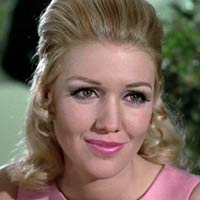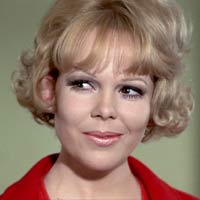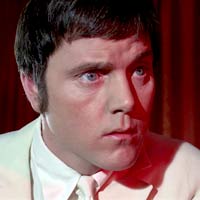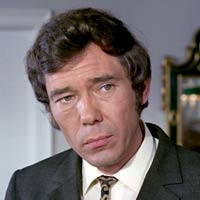|
|
|


|
 |
|
Image © ITV Studios, 1969 |
| |
Annette André
Character & Episodes:
Jean Hopkirk in all episodes except A Sentimental
Journey,
When the Spirit Moves You and The House on
Haunted Hill
Born: 24/06/1939, Sydney, Australia (as Annette
Christine Andreallo)
Born in Australia, Annette André's
father was an Italian who worked in a Sydney upholstery business
and married a local girl. Annette was educated at Brigidine
College in Sydney and her earliest wishes were to be a
ballerina. For a short time she was with the Australian Ballet
Company, but they dispensed with her services when they realised
that she was under age. Her path into acting can be traced to
when she was at a convent and a nun suggested she get into radio
and enrolled her at radio school. Radio was still then the main
entertainment medium, with television in its infancy. Annette
quickly became popular and appeared with Bob Hope and Benny Hill
when they toured the country. By then she was a dancer, singer
and worked in theatre as an actress as well. She was encouraged
by director Leslie Norman (the father of TV critic Barry Norman)
to try her hand as an actress. With this in mind she went to
Italy and played an extra in the 1963 epic Cleopatra.
Annette had earlier made a few appearances on Australian
television but these were only seen by the home audiences.
She then went to England and
appeared in the stage production of Vanity Fair. From
this she was cast as Jinny in the film This Is My Street
(1964).
This led to other notable parts on television, guesting in such
shows as The Saint (five episodes between 1964 and 1967), The
Prisoner, The Baron and The Avengers. Her good
looks and flowing blonde hair made her a natural for
the female lead guest star in such series. Another role she is
remembered for is Phila, a beautiful virgin concubine in the
1966 film version of the Broadway musical A Funny Thing
Happened on the Way to the Forum. Annette worked with silent
comedy legend Buster Keaton on the film and thought him "a
lovely old man". She also used her comic talents alongside Dick
Emery, Sid James and Benny Hill, and was one of the first
'Hill's Angel' girls. Hill even asked Annette to marry him. She
remembers Benny as "a wonderful man, very shy and lonely, and a
bit eccentric". She was for a while linked with the footballer
George Best, though Annette says the press made rather more out
of their couple of dates than the relationship warranted.
Annette had been considered for the
role of Sharron Macready in The Champions, though the role would go
eventually to Alexandra Bastedo. When Annette was later cast
as Jean Hopkirk in Randall and Hopkirk (Deceased), she would
often swap wardrobes with Alexandra as the concluding episodes
of The Champions were still
being filmed on a nearby set. The two women would become good friends.
After filming finished on Randall and Hopkirk (Deceased), Annette's career started to
slow down. She did however make notable contributions to The
Persuaders! and The New Avengers in the Seventies. She would also
star in the cheap and cheerful Midlands soap Crossroads and the Australian
prison drama series-cum-soap opera Prisoner (shown in the
UK as Prisoner Cell Block H). To date, her last screen
appearance was in the short film Nobis (2017).
Annette also appeared in London's West End in the mystery
thriller The Business of Murder at the Playfair Theatre in 1985.
In 1989 she married the producer Arthur Weingarten (1935- ) and retired
from the industry to start a family. She has a daughter,
Anouska, and two grandchildren. Annette lives in Southern
California but
visits London regularly to see her daughter. She devotes much of her time to animal welfare and has in
the past worked closely with Bill Travers and Virginia McKenna
of the Born Free Foundation. Annette loves to paint and has
sold several works. She wrote her autobiography, Where Have I
Been All My Life? - A Memoir, which was published by
Quoit
Media Limited in 2018. She has her own website -
annetteandreofficial.wordpress.com - and is active on
Facebook.
|
|
 |
|
Image © ITV Studios, 1969 |
| |
Judith Arthy
Character & Episodes:
Jennifer in The House on Haunted Hill and A
Disturbing Case
Born: 12/11/1940, Brisbane, Australia (as Judith Anne
Arthy)
Judith Arthy made her professional
debut at the age of 16 at the Brisbane Repertory Theatre, while
also working in teaching,
and would later appear on stage in Sydney in the musical play The
Fantasticks. She first appeared on Australian television in
the first half of the 1960s in series including
Consider Your Verdict, and a
number of other television productions.
She came to Britain in 1966 and appeared
immediately in an episode of The Baron with Steve
Forrest. She gained a few other roles, including another ITC
appearance in Man in a Suitcase (1967), before being cast in 1969
as the sister of Jean Hopkirk in Randall and Hopkirk
(Deceased). The role of Jenny Hopkirk was created and cast
to cover for the unexpected absence of regular cast member
Annette André (a fellow Australian) who had fallen ill. Judith played
Jenny in
two consecutive episodes (in terms of their production), with
the second featuring both Judith and Annette and belatedly
serving as Jenny's introduction. Other guest
appearances followed, most notably in Budgie (in 1971), Z Cars
(in 1971 and 1973)
and The Protectors (in 1973).
As well as
appearing on television, she played opposite Kenneth More in
The Secretary Bird at the Savoy Theatre, and also had minor
roles in the films The Shattered Room (1967) and Arthur?
Arthur? (1969).
In 1976, Judith featured as a regular cast
member alongside Derek Griffiths and Julia McKenzie in a
short-lived BBC comedy sketch series based on the differences
between men and women, called Battle of the Sexes. Later
in the same year, she made a guest appearance in one episode of
Big Boy Now!, an ATV situation comedy starring Leslie
Crowther and Fabia Drake. This would prove to be Judith's final
screen appearance in Britain.
By the mid-Seventies, Judith was also
working in her native Australia, where she
appeared in several television series, including Case For The Defence
(transmitted in
1978) and eventually settled. She
later taught English and Drama in a school in Brisbane, and went
on to write two novels. Judith made a return to the theatre in
2002. She has been twice married, firstly to actor Kerry Francis
and then to Australian croquet champion and film maker Aggy Read, until his death in 1998.
|
|
 |
|
Image © ITV Studios, 1969 |
| |
Kenneth Cope
Character & Episodes:
Marty Hopkirk in all episodes
Born: 14/04/1931, Liverpool, England (as Kenneth
Charles Cope)
Died: 11/09/2024, Southport, Sefton, England
The son of an engineer,
Kenneth Cope originally got a taste of acting in the Boy Scouts,
taking part in several gang shows. He later worked at the
Automatic Telephone Company, and was first encouraged to enter
acting seriously by his friend Norman Rossington. As a youth,
Kenneth was in a production of The Merchant of Venice at
the David Lewis Theatre in Liverpool, and at the age of 19 he
enrolled at the Bristol Old Vic. In 1952 he was in Shakespeare's
Measure for Measure with the Old Vic Company. He would
have spell at Cromer before he moved to London and entered
theatre in the city.
Kenneth began to appear on television from
the first half of the 1950s. His early television engagements
included a live
BBC Sunday Night Theatre play, The Duenna
(transmitted on 19th July 1953 with a second live performance on
2nd July 1953), Fabian of
The Yard (1955), Billy Bunter of Greyfriars School
(1955-56) and Ivanhoe (1958). In addition, Kenneth gained
minor roles in the films Doublecross (1956), The
Dangerous Years (1957) and Dunkirk (1958). Later he
was cast as Buggins in the drama series Kipps (1960), which starred Bryan Murray. The first real break for Kenneth was in
1961, when he was cast as Jed Stone in the soap opera
Coronation Street. During his first year working on this
series he met his wife Renny Lister. He left the show in
1966 and made a momentous return some 42 years later in 2008, and stayed
for a brief time. Whilst working on Coronation Street in
the Sixties he also joined the regular cast of the satire show
That Was The Week That Was (1962-63) and also wrote some
material for it.
Kenneth kept busy throughout
the Sixties, whether playing uncredited as a sailor in Carry On Jack
(1964), or in character roles in films such as Hammer's The Damned
(1962), Genghis Khan (1965), Night of the Big Heat
(1967), Hammerhead (1968) and The Desperados (1969).
On television he appeared twice in both Z Cars (1965 and
1967) and The
Avengers (1967 and 1968), in addition to a number of other
credits. His most famous
role followed when he played the ghost Marty Hopkirk in Randall
and Hopkirk (Deceased) from 1969-70 alongside Mike Pratt and
Annette André.
In 1971, Kenneth played the first of two leading roles in
the Carry On film series when he was cast as Vic Spanner in
Carry On At Your Convenience. The
following year he returned as Cyril Carter in Carry On Matron,
complete with him cross-dressing as a nurse in one of his most
entertaining performances. He continued to work steadily in film
and television through the Seventies, with roles in Rentadick
(1972), The Adventures of
Black Beauty (1973), The Famous Five (1978),
Minder (1979, with further appearance in 1985 and 1994) and Shelley (1979)
being highlights.
In 1980 he starred in the film version of George and Mildred
and worked on Doctor Who, playing Packard in Warriors Gate
(transmitted in January 1981).
In 1984 he wrote and starred in the comedy Bootle Saddles.
Sadly, this was not particularly successful and was cancelled
after just one series.
The Eighties saw Kenneth make guest appearances
in TV shows such as Rumpole of the Bailey (1987),
Casualty (1988 and 1994) and Bergerac (1989). In 1994 he
had a role in an
episode of Lovejoy and three years later he played a dodgy ex-copper
Charlie Fairclough in True Confessions - an episode of A Touch of Frost. From 1999 until 2002 he played Ray Hilton in
the Liverpool-based Channel Four soap opera Brookside. Later appearances, all on
television, included Doctors (2004 and 2007), The Bill (1992
and 2006) and
Last of The Summer Wine (1997 and 2008).
Kenneth also wrote scripts with his wife Renny
Lister (m. 1961) for numerous
programmes, which included Village Hall (1974-75), Striker
(1975-76) and The Squirrels (1976-77). The couple also once
ran a restaurant in Watlington, Oxfordshire, named Martha's
Kitchen after their daughter. They had three children:
Martha, an actress, and two sons, Nick and Mark,
musicians and former members of the rock band The Candyskins.
Kenneth's autumn years were spent living in
Southport, not far from the city of his birth. He suffered from
health issues in his eighties and into his nineties, but not
from the lung cancer he was mistakenly diagnosed as suffering
from in 2000 and was treated for for six years before the error
was realised. He passed away in his sleep on 11th September 2024
at the ripe old age of 93, with his wife Renny and their three
children at his side.
|
|
 |
|
Image © ITV Studios, 1969 |
| |
Mike Pratt
Character & Episodes:
Jeff Randall in all episodes
Born: 07/06/1931, London, England (as Michael John
Pratt)
Died: 10/07/1976, Midhurst, West Sussex, England
Born in London, the son of a
journalist who later went into advertising, Mike Pratt grew up wanting
to be an actor from an early age. His initial steps, though,
were to follow in his father's
footsteps into advertising after the disruption caused by the
Second World War. After five years, Mike
landed a job as an assistant stage manager in a revue, and
whilst working on this he was introduced to a young Shirley
Bassey. He soon got tired of the job and went back to
advertising but also gained some minor acting roles. Mike's
restlessness struck once again, and before long he had quit and
was touring Europe in an old taxi with three friends, one of
whom was Lionel Bart, later to rise to fame as a writer of songs
and musicals. Mike himself was an accomplished jazz musician and
he played the piano, guitar and skiffleboard. After returning
from Europe in 1956, Lionel introduced him to a friend of his
called Tommy Hicks at a party. They became friends and performed
together, Tommy singing and playing the guitar whilst Mike
played the piano. This led them to form a band called The
Cavemen. The group played in pubs and coffee bars, Tommy Hicks
soon changed his name to Tommy Steele, and Mike started writing
songs for the band. Locally the band grew in reputation, were
spotted by a representative of the Decca Record Company, and by
autumn 1956 had released their first single Rock with the
Cavemen, which made the top twenty of the British Pop
Charts. Other songs recorded were Handful of Songs,
Water, Water and Butterfingers, the latter being a
favourite of Tommy Steele. Tommy would soon embark on his solo
career, but Mike and Lionel Bart would still write his songs.
The song The Duke Wore Jeans went to number 1 in the
charts in 1958 - and Mike received a story writing credit on the
film of the same name during the same year. The following year, Little White Bull – a
song written by Mike – went to number 4 (as did Tommy's album)
and received the 1959 Songwriters Guild Ivor Novello Award for
best novelty song. About this time Mike formed his own folk
group called the Cotton Pickers. With Mike on piano and washboard, the group played mainly in clubs over the next couple of
years.
Mike then tried his hand at
writing, and speculatively wrote a number of plays and
television scripts, but sadly gained no commissions. During this
period Mike got married and would have two children, Karin
Louise and Guy Adam (Guy would also be a musician and played
bass with Pink Floyd for a while). After his writing failures
Mike was determined to become an actor. His early television
appearances included minor roles in the ABC Television's Out
Of This World (1962), a BBC Sunday Night Play (1963)
and Maupassant (1963) for Granada Television. He gained his first real break when
he was cast as Sid Graham in the film This Is My Street
(1964).
The film was also notable for the appearance of a young
Australian actress called Annette André. As a result of this,
Mike started to appear regularly on television, and was also
writing for the Dave King sitcom Dave's Kingdom, a weekly
half-hour show that ran in the last quarter of 1964. In 1965,
Mike appeared in four episodes of Danger Man with Patrick
McGoohan, acted as lyricist on a song featured in the film Be
My Guest, and became a regular in the TV serial The Fatal
Slip. For 1966, he joined the Royal Shakespeare Company and
appeared in several notable productions. The following year was
a busy one for Mike, with him taking on guest spots in a number
of well-known series including The Saint, Theatre 625
and Man in a Suitcase.
At the end of May 1968 he
began filming on Randall and Hopkirk (Deceased). Producer
Monty Berman later said, "He was the first to be cast; he had
just the touch we needed for the character of Jeff Randall." It
would be this series that would propel Mike to national
recognition and become the role he is most fondly remembered
for. He would also co-write the episode A Disturbing Case.
Apparently, Mike was a quiet man and during filming would often
stay in his dressing room playing the guitar. Many of the
pictures in Jeff's apartment in the show belonged to Mike.
However, he did not end the series as he would have wished. Due
to an accident that occurred while he was celebrating his 38th
birthday - it was not a good idea to climb a 20-foot drainpipe
while drunk - Mike broke both his legs and this meant that he
was bed-ridden in the final episode produced, The Ghost Talks.
Production on the show wrapped in July 1969 after fourteen
months of filming.
His next notable role was in
early 1970 in the sci-fi series UFO which starred Ed
Bishop and Michael Billington. The following year he played an
army deserter in Long Voyage Out of War, which Mike cited
as the most challenging acting role he ever played. He continued
to be busy in the years that followed, appearing in a variety of
television series such as Jason King, Owen MD,
Arthur of The Britons, Black Beauty and Crown
Court. In 1973 he appeared in the horror film The Vault
of Horror. His last main role was as Don Stacey in the
popular mid-Seventies series The Brothers. However, by
this time, Mike was not a well man, looking far older than his
years. Mike's character was an alcoholic airline pilot and,
despite being ill, he appeared in the show until January 1976
when he was admitted to a hospital near Guildford, Surrey.
Sadly, Mike would lose his battle with lung cancer on 10th July.
He was cremated at Golders Green Cemetery and his ashes were
scattered in Section 3-Q. On 8th August, a special show was
staged in his honour at the London Aldwych Theatre, the proceeds
from which went to his family. Amongst the numerous celebrities
and friends in the show were Glenda Jackson, John Le Mesurier,
Fenella Fielding and Harry H Corbett.
In his private life, Mike got married in
1959 to Tessa Jenkinson, who at that time was a script typist
and who also at some point worked in the wardrobe department of the Mermaid
Theatre. The couple would go on to have two children, Karin and
Guy. Kenneth Cope summed up Mike Pratt beautifully some years
ago: "A lovely man. Should have been destined for big things -
maybe Hollywood. A great writer and actor. I miss him a lot. He
was a good friend."
|
Section compiled by Darren Senior
Additional research and presentation by Denis Kirsanov and Alan Hayes
with thanks to Richard Lawrence
|
|
|
Back to Top |
|



